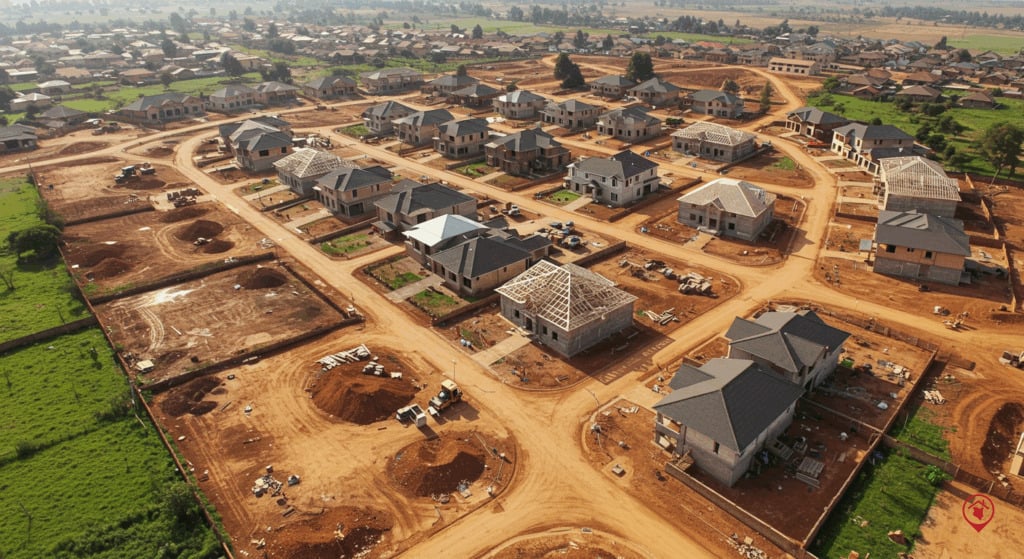Should You Buy Off-Plan? What to Consider Before Making That Deposit
- As property prices continue to rise and mortgages remain out of reach for the average Kenyan, thanks to high interest rates and tough qualification criteria.
- Even with all its appeal, buying off-plan isn’t without risks and many of those risks show up in the fine print or get hidden behind flashy brochures and site visits.
- Buying off-plan doesn’t have to be a gamble—if you take time to vet the project and the people behind it.
A lot of people dream of having a space to call their own, something they can be proud of and settle in, probably after years of moving from house to house. For Sharon, that dream was no different. At 35, she was finally ready to become a homeowner.
She did her research and stumbled upon an upcoming estate that was selling units off-plan. The prices were far lower than similar homes on the market, and she loved the idea of having a say in the interior finishes of her future home. To her, it seemed more than ideal, affordable, promising, and full of potential.
So she made the leap and invested in her future.
Unfortunately, what should have been a joyful milestone became a costly lesson. The developer wasn’t as honest as advertised. Construction stalled, the houses were left incomplete, and communication from the sales team dried up. Sharon, along with dozens of other buyers, was left stranded—money gone, no home in sight, and no clear path forward.
And Sharon’s case isn’t unique.
Across Kenya, an increasing number of buyers are falling victim to off-plan property deals gone wrong. Some are dealing with ghost developers who disappear after collecting millions. Others are stuck in limbo years after paying for homes that were supposed to be delivered in 18 months.
So, why do people continue to buy off-plan? What makes it so appealing? And more importantly, how can buyers protect themselves and recover if things go sideways?
READ ALSO: Off-plan Property Investment and What You Should Know and Consider
Why So Many Kenyans Buy Off-Plan
So why do so many people still buy off-plan properties, despite all the horror stories? The truth is, off-plan deals are undeniably tempting. As property prices continue to rise and mortgages remain out of reach for the average Kenyan, thanks to high interest rates and tough qualification criteria, off-plan seems like a much more accessible path to homeownership.
With most off-plan arrangements, all you need is a deposit, usually between 10% and 30%, and the rest is paid through a flexible installment plan. These payments are often tied to construction milestones or spread out monthly over 12 to 36 months, giving buyers time to plan and save without needing to secure a bank loan.
It also helps that off-plan units are often priced lower than completed properties. Developers use early-bird pricing to attract buyers, making it feel like you’re getting in at the ground floor of a promising investment. For many, it’s not just a home, it’s an opportunity to secure a future before prices go even higher.
Red Flags Buyers Often Miss
Even with all its appeal, buying off-plan isn’t without risks and many of those risks show up in the fine print or get hidden behind flashy brochures and site visits. For first-time buyers especially, it’s easy to get caught up in the dream and miss the warning signs. Here are some of the most common red flags that buyers tend to overlook:
1. Lack of Proper Documentation
If a developer can’t show you a valid title deed, approvals from county government, and permits from NCA (National Construction Authority), that’s a red flag. Some buyers only ask for this paperwork after they’ve already paid a deposit—and by then, it’s too late.
2. Unrealistically Low Prices
Yes, off-plan is usually cheaper, but when the price is too low to make sense, it often is. Some developers bait buyers with pricing that doesn’t reflect the real cost of construction or land. The project either stalls halfway or never breaks ground at all.
3. No Clear Project Timelines
Be cautious if the developer gives vague timelines or avoids committing to specific phases of construction. You need clear delivery milestones in writing, not just verbal promises of “possession in 18 months.”
4. No Escrow or Secure Payment Structure
If the developer is asking you to pay directly into a personal or company account with no escrow system, you’re essentially funding the project at your own risk. A proper setup protects both parties and ensures funds are used for actual construction, not something else.
5. Poor or No Track Record
A lot of developers claim experience, but some have never completed a project. Always ask for site visits to their past developments, speak to buyers if possible, and check if their name appears on litigation records or land disputes.
What to Do If You’ve Been Burned
If you’ve been burned in an off-plan deal, first take a breath. It’s frustrating, painful, and honestly unfair. But it happens more often than most people realise, and what matters now is how you move forward.
Start by retracing your steps. Go through your paperwork, receipts, and any agreements you signed. Try to get clarity on where the process stalled—was it the land? Approvals? Construction? Sometimes the project is just delayed, not dead.
Next, talk to others who bought into the same development. You’d be surprised how many people are quietly in the same boat. Forming a group can help you share updates, stay informed, and even push for progress together.
And while it’s tempting to walk away and forget the whole thing, don’t disappear just yet. Stay in touch with the developer (if possible), check the site once in a while, and keep records of everything. Projects that stall sometimes resume months, or even years, later.
Most importantly, don’t let the experience kill your dream of owning a home. Learn from it, ask harder questions next time, and know that being cautious doesn’t mean being fearful, it means being smart.
How to Vet an Off-Plan Deal Before You Buy
Buying off-plan doesn’t have to be a gamble, if you take time to vet the project and the people behind it. Many buyers get caught up in the excitement of homeownership and sign on too quickly. But the truth is, a little extra homework upfront can save you from months, or years, of stress down the line.
Here are a few things to check before putting your money into any off-plan deal:
1. Start With the Developer’s Track Record
Have they delivered projects before? Where? What do those properties look like today? Don’t just take their word for it—go see the completed units and, if possible, talk to the people who live there.
2. Ask for Proof of Approvals
A developer should be able to show you key documents: a valid title deed, change of user approval (if required), NEMA approval, building plans, and permits from the county government and National Construction Authority (NCA). If any of these are “still in process,” that’s a red flag.
3. Visit the Site
Photos and brochures can be deceiving. Take a day and go to the physical site. Is there any activity on the ground? Are the workers there? Is the project at the stage they say it is?
4. Understand the Payment Structure
How are they handling your money? Is there a payment plan? Will funds be held in an escrow account or going straight to the developer? A secure payment structure protects both sides, and you should never feel pressured to pay everything upfront.
5. Get an Independent Lawyer
Don’t just use the lawyer “recommended” by the developer. Get your own legal advice. A good lawyer will look through the sale agreement, point out unclear terms, and help you understand your rights and obligations before you sign anything.
6. Don’t Rush
If a deal is legit, it’ll still be there tomorrow. High-pressure tactics like “only two units left!” are meant to push you into quick decisions. Take your time. Ask questions. If they get uncomfortable when you do, that’s your answer.
READ ALSO: Unlock the Secrets -10 Must-Know Tips for Off-Plan Buyers!
Conclusion: Off-Plan Isn’t the Enemy, Blind Trust Is
Buying off-plan isn’t a bad idea in itself. In fact, for many Kenyans, it’s one of the few affordable ways to enter the property market. But as we’ve seen, it comes with its own risks, and when things go wrong, they go very wrong.
The key is not to write off off-plan entirely, but to go into it with your eyes wide open. Do your homework. Ask questions. Push for clarity. Visit the site. Involve a lawyer. And most importantly, don’t let anyone rush you into making a decision you’re not fully sure of.
If you’ve already had a bad experience, don’t beat yourself up. It happens more than people admit. Learn from it, share your story if you can, and approach your next step with the wisdom you didn’t have the first time.
At the end of the day, the goal remains the same, to own a home you can be proud of. Just make sure the path to getting there is as solid as the foundation you want to build on.
READ ALSO: Why Are Kenyans Shying Away from Buying Off-Plan Houses?








